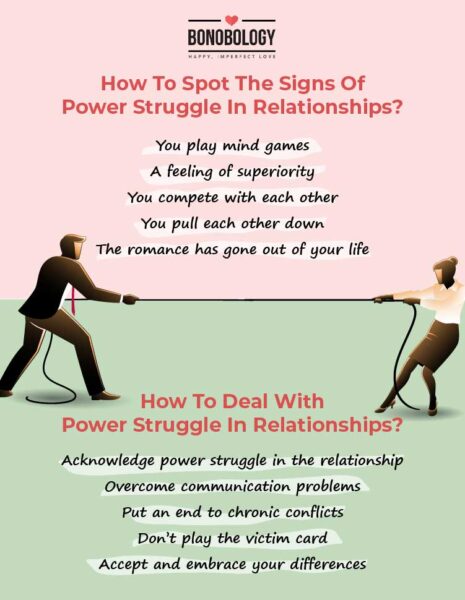What does power struggle mean for the future of a relationship? Is every relationship a power struggle? Is it necessarily an ominous sign? Can power struggle in a relationship be a positive thing? Does it always and unequivocally mean one partner clipping the wings of another? When we closely examine the balance of power in any romantic partnership, many questions of this nature spring up. To be able to address them and comprehend the role of this relationship dynamic, we decode the intricacies of power struggle in consultation with advocate Siddhartha Mishra (BA, LLB), a lawyer practicing at the Supreme Court of India.
What Is Power Struggle In Relationships?
At the beginning of any relationship, both partners experience ‘limerance’ – more popularly known as the honeymoon period – where their bodies release a lot of feel-good hormones that encourage them to bond. In this phase, people look at their partners and relationships with rose-tinted eyes. The positives are magnified and the negatives minimized. Over time, this rush of hormones recedes, allowing you to view your partner realistically. This is when differences in opinions, annoying habits, quirks, and personality traits that stick out like sore thumbs come to the fore.
This transition marking the end of the honeymoon phase of a relationship is natural and inevitable. When it happens, couples enter the power struggle stage in the relationship. Elaborating on the power struggle phase in relationships, Siddhartha, who has seen up close what disbalance on this front can do to a couple, says, “Power struggle stage in a relationship is where one feels the need to ‘dominate’ the other.
“As the honeymoon phase of a relationship draws to a close, along with this comes the list of differences, disappointments, and disagreements. Partners don’t listen to each other, try to find flaws, and become defensive when their own faults are pointed out. The other partner either retaliates or tries to avoid engaging in the whole process, thus leading to problems. These are some of the early signs of power struggle in relationships.”
If you’ve wondered when the power struggle stage starts, you now know the exact timeline of when a play of dominance begins to emerge. However, to overcome the power struggle stage in your relationship, it is also imperative to know what this push-and-pull can do to your bond and at what point it begins to pose a threat to your future together.
Power struggle in marriage or relationships can become permanent and unhealthy if a couple doesn’t learn new ways to communicate and reach out to each other. This push-and-pull of power is inevitable. From that point of view, every relationship is a power struggle. However, positive use of power in relationships can happen only when couples accept this inevitability.
According to Gottman Method Therapy, this means making peace with the ‘perpetual problems’ in the relationship. Then, coming to an understanding that some differences will always remain is the first essential step to overcome the power struggle stage in your relationship. The only way to work around them is to come to a certain level of understanding where you agree to disagree.
4 Types Of Power Struggle In Relationships
What is a relationship power struggle? Is power struggle a negative trait to have in a relationship? Can there be a positive use of power in relationships? When you begin to see that you and your partner are caught in a tug-of-war for power, such worrying thoughts and their implications for the future of your relationship can begin to weigh on your mind. Understanding the 4 types of power struggle in relationships will give you clarity on whether what you’re dealing with qualifies as healthy and positive or toxic and negative:
1. Demand-withdrawal power struggle
Power struggle meaning here is that one partner seeks discussion, action, and change as they seek resolution of conflict, differences, and relationship issues. Whereas, their partner avoids dealing with issues, out of fear or anxiety that it will aggravate relationship problems.
One of the examples of power struggles in relationships is the silence that follows arguments between couples. In the demand-withdrawal power struggle, one partner gives the other time and space to cool off, while the other doesn’t shut them down when they finally make an attempt to resolve the issue.
Since both partners have the best interests of their relationship at heart, and they exercise patience to give each other what they want, this kind of struggle can lead to the positive use of power in relationships. Provided both are willing to compromise on their respective positions and find common ground.
2. Distancer-pursuer power struggle
This power struggle dynamic occurs when one partner craves and tries to establish a certain degree of intimacy, but the other considers it ‘smothering’ and runs away. The pursuer feels that their partner is cold or maybe withholding affection on purpose. On the other hand, the distancer finds their partner to be too needy. One of the distancer-pursuer power struggle examples in relationships is push-pull dynamics. In such relationships, both partners are caught in an unhealthy hot-and-cold dance, unable to agree on an acceptable extent of intimacy. A classic example is someone who switches off their phone after a fight in a long-distance relationship, while the pursuer anxiously and frantically tries to reach out through a friend or family. This is among the examples of power struggles in relationships that can be seen if both partners have divergent attachment styles. For instance, if an avoidant-dismissive person ends up with someone who is anxious-ambivalent, the distancer-pursuer power struggle is likely to take hold in their dynamic.
3. Fear-shame power struggle
The fear-shame power struggle meaning is that one partner’s fear triggers shame in the other. This is often a result of one’s fears and insecurities that bring out feelings of avoidance and shame in the other. And vice versa. For instance, in a relationship with financial stress, if one partner is worried about not having enough money, the other may feel ashamed that they’re not earning enough. As a result, when one person feels stressed or worried about certain situations, the other becomes withdrawn in order to hide the shame they’re feeling. The more withdrawn one partner becomes due to shame, the partner experiencing fear tends to overshare as they think they were not being heard. This creates a negative downward spiral. Since fear and shame are often called the most debilitating negative emotions, the stages of relationship power struggle can quickly escalate to unhealthy and toxic in this dynamic, taking a toll on the mental health and self-esteem of both partners.
4. Punishment-avoidance struggle
This form of a power struggle in relationships is rooted in one partner’s need to punish the other. This partner will lash out at the other with criticism, anger, and demands. They also try to hold back love, letting it flow in trickles, treating love as a manipulative tool to exercise reward and punishment. To avoid being punished, the other partner retreats into a shell and becomes emotionally unavailable. Such power struggle in marriage or relationships is the most toxic, and is marked by ultimatums and threats. As a defense mechanism, the person at receiving end of such contemptuous behavior often resorts to silent treatment, which only augments the negative emotions in the partner who seeks to punish. Resentment and hostility toward a partner are classic examples of power struggles in relationships in such cases. Extreme frustration is another tendency the partner at the receiving end is inflicted with. Even though both partners may choose to stay together, there is a palpable undercurrent of negativity in their dynamic.
Why Is There A Power Struggle In Relationships?
According to psychology, the power struggle in relationships has the potential for compelling unmotivated behavior in another person. Suppose a relationship is off balance and both the partners understand their power, the off-balance and the oscillation stay relatively leveled and balanced. The stages of relationship power struggle do not escalate and venture into unhealthy territory in such cases. Siddhartha says that the reason power struggle exists in relationships is that no two individuals are alike. “This fact is very much forgotten in the days of early romance. As an individual grows, they undergo unique experiences that shape their personalities and outlook. Since no two people have the exact same experiences, romantic partners will always have areas of disagreement that can be difficult to resolve. It is these disagreements that cause power struggles.” According to Siddhartha, contradiction is the law of life, progress, and mobility. “We all are contradictions. Contradiction is everywhere in creation, not uniformity. There is no uniform philosophy in life. Power struggles in a relationship are normal. After all the excitement and romance of the initial days of your relationship fade, you are ultimately left with two people who, although bound together in a relationship, are still unique,” he adds. It is this uniqueness that becomes the trigger for a power struggle in relationships. How this play for power is exercised determines its impact on the quality of a romantic partnership. “When there is a positive use of power in relationships, it results in the growth of your relationship. In this type of struggle, you establish or reinforce the rules of engagement when it comes to arguments in a relationship and common issues. “It is when power struggle escalates and begins to focus on a partner’s individual needs rather than the shared needs as a couple that it begins to affect the relationship adversely. One person will pursue the other with anger, criticism, and demands while the latter retreats and withdraws,” Siddhartha says.
Do All Couples Go Through A Power Struggle?
Technically speaking, every relationship is a power struggle. The power struggle phase is just one of the five stages of every relationship. It comes in the beginning of the relationship, right after the initial honeymoon phase. When two individuals are put together, their natural differences create friction and resistance. This is both inevitable and essential. This friction allows partners to understand each other’s boundaries and limitations, their strengths and weaknesses. It helps them know how much they can compromise with and what their unyielding values are. So, it would be right to say that every couple does go through a power struggle phase. But ideally, it should just be a phase. Only then can it be considered a healthy power struggle. A couple should be able to understand themselves and each other better and learn effective ways of communication to navigate their way out of it and stop a power struggle in a relationship. They should know how to use it to their advantage. What is a relationship power struggle example? Here it is: A new couple, Sara and Mark, after the initial honeymoon attraction come to realize that they have different attachment styles with their friends and families. Their understanding of leave and cleave boundaries differ. This causes friction between the two partners. While Sara finds it natural to shift all her attention and allegiance to her partner quite effortlessly, Mark still wants to take out time for old relationships and involve them in travel plans or outings. Post a demand-withdrawal power struggle between the two, each should ideally be able to effectively communicate the reasons for their expectation from the other. They should be able to see this difference between their personalities objectively and give each other the space to pursue other relationships at their own pace. The more extrovert partner, Mark, should also understand Sara’s insecurities and accommodate her need for exclusive couple bonding time. That is how you stop a power struggle in a relationship.
How To Spot The Signs Of Power Struggle In Relationships?
Understanding the power struggle meaning in psychological terms is one thing, learning to spot this tendency in your relationship is quite another. Often, the transition from one to the other isn’t easy. That’s because we’re in denial about our underlying relationship issues. If you feel that both you and your partner tend to resort to a constant one-upmanship but aren’t sure whether it qualifies as an indicator of a power struggle in relationships, pay attention to these surefire signs:
1. You play mind games
One of the most telling power struggle examples in relationships is the tendency to play mind games to manipulate one another. Whether it is constantly bringing up an ex or deliberately not texting first but always responding, these behaviors are tools for controlling your partner’s mind, instincts, and actions. When either of you has an issue with the other, you fall back on a passive-aggressive approach to convey your displeasure. Honest, open communication is too difficult in your relationship. These are one of the early signs of power struggle in relationships. The person playing the mind games loses track of what is important in the relationship, prioritizing their own ‘victory’ over the health of the relationship.
2. A feeling of superiority
What does power struggle in relationships look like? A telling indicator is that yours is not a partnership of equals. Far from it, in fact. One or both of you live with an unshakeable feeling of being superior to the other. Be it owing to the nature of your professions, your family backgrounds, education or financial status, at least one partner feels like they’re settling for less than they deserve. As a result, the ‘settler’ feels a constant need to patronize and dominate the ‘reacher’, resulting in an unhealthy power struggle. The ‘reacher’ faces debilitating low self-esteem issues. Such examples of power struggles in relationships are common in the fear-shame dynamic, where one partner constantly makes the other feel like they’re not enough, pushing them into a cocoon of emotional withdrawal.
3. You compete with each other
Rather than operate as a team, couples with a strong power struggle in marriage or a relationship feel a need to compete with each other. Whether it is on the professional front or petty things like who looks better for a party, you’re constantly trying to outdo each other. If, for example, news of your partner getting a raise leaves you with a pit in your stomach or your promotion leaves them feeling visibly jealous, you can count these among the early signs of power struggle in relationships. On the other hand, through healthy power struggle, a couple would learn their emotional triggers and what evoked the sense of jealousy in them. They would acquaint themselves with the various types of insecurities in a relationship, recognize theirs, find ways to heal, and communicate effectively what each of them needs, to ensure that their relationship is not plagued by envy.
4. You pull each other down
Another classic sign that you’re stuck in the power struggle stage in a relationship is that either your partner pulls you down or you do the same to them. Perhaps you both have a go at it from time to time. Do you notice a tone of derision in your partner’s opinions of your actions, accomplishments, and shortcomings? Or find yourself overcome with contempt toward theirs? Does it feel like you’re always justifying yourself to your partner? Or they to you? When partners begin to pull each other down, in private or public, rather than lift each other up, it’s a sign that you’re grappling with an unhealthy power struggle. Ashlyn, a creative arts students, says, “I was dating an investment banker who never missed an opportunity to make me feel inadequate about my accomplishments. He’d take me out to extremely posh places where splitting the bill would have meant me blowing off money worth an entire month’s expenditure over a single meal. “He’d pick up the tab every single time, but not without a condescending remark or a full-blown lecture on how I wasn’t doing anything worthwhile in life. Because I chose to stay quiet about it, the stages of relationship power struggle escalated quite quickly. We reached a point where he started making decisions for me. That’s when I knew I had to leave that toxic relationship.”
5. The romance has gone out of your life
Can’t remember when you did anything special for each other? Or went out for a date night? Or just spent a cozy evening together, wrapped in a blanket, talking and laughing? Instead, do you and your partner end up bickering over chores, errands, and responsibilities? You have reached this stage of power struggle in relationships through constant withdrawal, avoidance, distancing, and silent treatments. You, your partner, or both have become comfortable in not communicating or interacting to avoid hurt and anger, and so, the level of intimacy in your relationship has taken a hit. These patterns are the hallmarks of the power struggle phase in relationships. Unless you take conscious steps to snap out of it by mindfully breaking problematic patterns and working on improving communication, your relationship will continue to suffer.
How To Deal With Power Struggle In Relationships?
Dealing with a power struggle in relationships is not easy. It requires conscious work from both partners to break unhealthy relationship patterns and replace them with healthy practices. Siddhartha says, “Perfect partners don’t exist. Once the power struggle phase in relationship begins, you can quickly go from looking at your partner as a perfect match to finding fault with everything they do or say. “Don’t let the current disagreements lead to idolizing and demonizing the present. Remember that taking care of your relationship and significant other is a part of taking care of yourself.” But how do you achieve any of this? Here are 5 steps that will help you overcome the power struggle stage in your relationship and build a holistic connection:
1. Acknowledge power struggle in the relationship
A power struggle in the beginning is inevitable. New triggers may reintroduce power struggles in a relationship. As with any relationship issue, the first step toward healing and moving past power struggle is to acknowledge that you’re grappling with it. This requires clearly spelling out the problem. On the surface, it may seem like your problem is constant arguing or fights that turn heated and volatile. You may be aware that this is costing you stability and intimacy in the relationship. If the superficial measures you’re taking to counter these tendencies don’t help, it’s time to scratch the surface and look deeper. Perhaps you and your partner are actualizing each other’s deepest relationship fears – be it a fear of abandonment, rejection, being controlled or trapped. It’s only by identifying the root cause of power struggle in marriage or relationships that you can take concrete steps to weed it out. Or at least find a way around it.
2. Overcome communication problems
You need to overcome communication barriers to overcome the power struggle stage in your relationship. The key to any healthy and balanced partnership is open and honest communication. Even so, communication problems in relationships are more common than most people like to acknowledge. Siddhartha says, “Getting out of the power struggle means learning to communicate better. The more one can work toward acknowledging and accepting one’s power, the more it will calm and center one in the relationship.” This essentially means learning the art of intuitive communication that allows you to lay your heart bare to each other without touching any raw nerves. This can help partners to renew the strong connect that they felt at the beginning of the relationship. Building on this connection paves the way forward for healthy intimacy sans any power struggle.
3. Put an end to chronic conflicts
Having the same fights over and over again can leave you trapped in the cycle of destructive patterns. These patterns then fuel the inherent insecurities, fears, or apprehensions that trigger a power struggle in the relationship. For instance, say one partner fights with the other about not giving them enough time or attention, and the other retorts back demanding more personal space. This is one of the classic demand-withdrawal power struggle examples in relationships. The more you fight about it, the more the demanding partner will fear being abandoned and the withdrawer will become detached or aloof. That’s why ending recurring conflicts and preventing the escalation of issues is crucial. “Take time-outs to prevent fights from escalating. An escalation in conflict causes fear, uncertainty, and a tendency to protect oneself at the expense of what is good for the relationship,” says Siddhartha. Unless these destructive patterns are broken, you can’t forgive each other for past mistakes or let old wounds heal. Without it, trust is not restored between partners. Only from trust comes a sense of security that enables you to move past the power struggle stage in a relationship.
4. Don’t play the victim card
Whether you feel smothered, shamed, or punished by your partner, it’s natural for a sense of victimhood to creep in. You’re the one whose freedom is being taken away. The one who is made to feel guilty for all that’s not right in the relationship. The one who has to bear the brunt of angry outbursts. Before you demonize your partner in your mind, take a step back and evaluate whether it’s really the case. Have you been unwittingly playing a part in the power struggle in your relationship turning toxic? Are you somehow projecting your own fears onto your partner? Does that make the relationship dynamics more complex? To overcome the power struggle stage in your relationship, you need to look at your equation from a fresh perspective. “Once you see the whole picture, it’s easier to take a step back and allow room for resolution,” Siddartha says.
5. Accept and embrace your differences
As Siddhartha points out, no two people are alike. Nor are their life experiences, outlooks, and perspectives. However, when these differences become a source of clashes, neither partner can be their authentic self in the relationship. Then, as a self-defense mechanism, both start working toward consolidating power. In the hope that the ability to manipulate the other will give them a chance to be who they want to be. This approach often proves counter-productive, leaving both partners caught in a deeply entrenched power struggle stage in a relationship. A seemingly simple – even though it’s easier said than done – way to counter this is by actively working to accept and embrace each other’s differences. Say, one partner tends to be overly critical and this causes the other to become evasive. The onus of breaking this pattern falls on the couple as a team. While one needs to learn to get their point across without resorting to harsh words or low blows, the other needs to listen with an open mind and without taking offense. When both partners feel secure enough to be their authentic selves in the relationship, without feeling pressured to do or say things for the sake of keeping the peace or pleasing their SO, they can let go of a negative power struggle. Overcoming power struggle in marriage or relationships is not easy. It doesn’t happen overnight. Nor is there a magic button that can reset couple dynamics to an ideal mode. You have to be committed to making conscientious efforts, day after day, to get past the power struggle stage in a relationship. If that’s something you’ve been struggling with, consider talking to an expert on Bonobology’s panel of counselors or a licensed therapist near you. Working with a trained professional can give you clarity about your behavior patterns and the underlying triggers.




